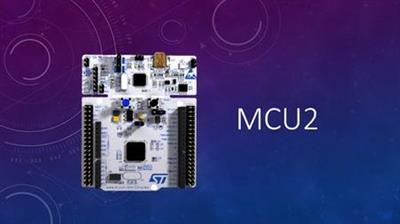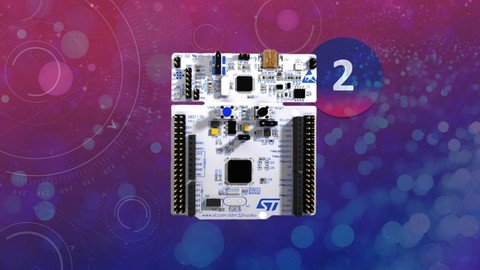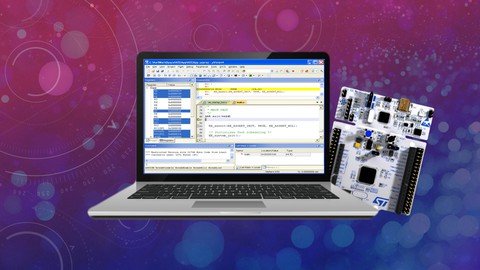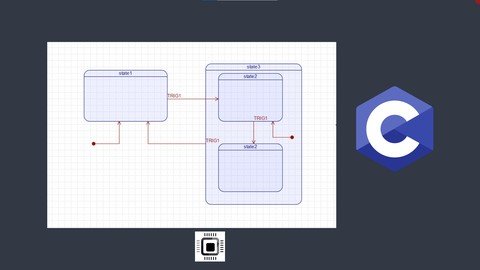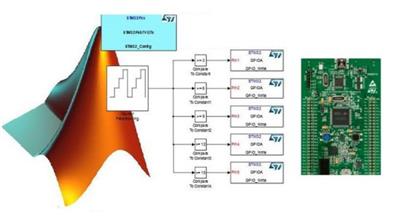Stm32Fx Microcontroller Custom Bootloader Development
"softddl.org"
20-08-2022, 09:57
-
Share on social networks:
-
Download for free: Stm32Fx
-
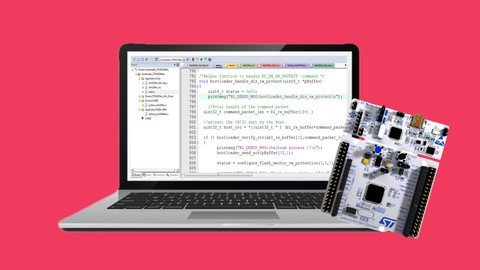
Last updated 8/2022
MP4 | Video: h264, 1280x720 | Audio: AAC, 44.1 KHz
Language: English | Size: 3.23 GB | Duration: 7h 31m
Learn fundamentals of Bootloader Development for your ARM Cortex Mx based STM32Fx Microcontroller

Last updated 8/2022
MP4 | Video: h264, 1280x720 | Audio: AAC, 44.1 KHz
Language: English | Size: 3.23 GB | Duration: 7h 31m
Learn fundamentals of Bootloader Development for your ARM Cortex Mx based STM32Fx Microcontroller
What you'll learn
Write your own custom bootloader for your STM32Fx microcontroller and test
Host Bootloader Communication implementation
Custom Bootloader command packets
Different boot modes of the STM32 Microcontroller
Boot loader flash handling implementation : Sector Erase/Program/Mass erase
Boot loader options bytes(OB) Program handling implementation
Boot loader Flash sector protection status handling implementation
Boot loader In application programming implementation (IAP)
Vector table relocation of ARM cortex Mx processor
Requirements
STM32Fx based board is needed if you want to test the code developed
Basic 'C' Programming Knowledge is required but not mandatory
Description
Get started with Micro-controller Bootloader Development. This course will be suitable for beginners in the domain of embedded systems and programming.This course is all about learning to develop a custom BootLoader for ARM CORTEX Mx powered STM32Fx microcontroller.In this course, I will guide you through a step-by-step procedures to develop your own BootLoader and we will explore many things related to BootLoader programming.The BootLoader we are going to develop in this course will have the following features1) It can do in-application programming(IAP). You can use the BootLoader to flash a given application binary2) Read microcontroller-specific data3) Flash related configurations like setting up read and write protections for different sectors4) Flash sector erase5) Mass erase of the user flash6) Read and display the protection status of the flash memory7) Jump to the specified address to execute the codeAlong with custom BootLoader development, you will also understand1) The different memory organization of a microcontroller2) Memory aliasing and different boot modes of STM323) How MCU boots after power-up4) Vector table mapping and vector table relocation use case of arm cortex mx processor.5) Difference between In-system programming(ISP) and in-application programming(IAP)6) Custom boot loader design flow chart7) Host and Boot loader communication method8) Implementation of different boot loader commandsYou can also extend this BootLoader by giving the following features once you complete the course1) Encrypt and Decrypt the firmware sent by the host using AES2) Over-the-air programming by interfacing WIFI or Zigbee ModulesHardware used in this course:In this course, STM32F446RE Nucleo board is used.If you have any other board based on the STM32 microcontroller then also you can use the codes developed in the course with no or minor changes.Software used:1) KEIL-MDK-5 for WINDOWS2) OpenSTM32 SystemWorkbench for (WINDOWS/LINUX/MAC OS)Learning order of FastBit Embedded Brain Academy Courses,If you are a beginner in the field of embedded systems, then you can take our courses in the below-mentioned order. This is just a recommendation from the instructor for beginners. 1) Microcontroller Embedded C Programming: absolute beginners(Embedded C)2) Embedded Systems Programming on ARM Cortex-M3/M4 Processor(ARM Cortex M4 Processor specific)3) Mastering Microcontroller with Embedded Driver Development(MCU1)4) Mastering Microcontroller: TIMERS, PWM, CAN, RTC,LOW POWER(MCU2)5) Embedded System Design using UML State Machines(State machine)6) Mastering RTOS: Hands-on FreeRTOS and STM32Fx with Debugging(RTOS)7) ARM Cortex M Microcontroller DMA Programming Demystified(DMA)8) STM32Fx Microcontroller Custom Bootloader Development(Bootloader)9) Embedded Linux Step by Step using Beaglebone Black(Linux)10) Linux device driver programming using Beaglebone Black(LDD1)
Overview
Section 1: Course Overview
Lecture 1 About the instructor
Lecture 2 Course Overview
Lecture 3 Important Note
Lecture 4 Source Code Repository
Section 2: Introduction
Lecture 5 What is Boot-Loader and Why it is needed ?
Section 3: MCU memory, Reset Sequence and Boot configs
Lecture 6 MCU-Embedded Memory Organization
Lecture 7 Understanding Reset Sequence and memory Aliasing of the MCU
Lecture 8 Boot Configurations of the STM32 MCU.
Section 4: Development board used in our courses
Lecture 9 Note for the students
Lecture 10 About MCU Development board
Lecture 11 STM32F4 Discovery and Nucleo : Board Details
Lecture 12 ST-Link Driver Installation
Lecture 13 ST Link Firmware Upgrade
Section 5: KEIL-MDK-5 IDE setup for ARM Cortex M based MCUs
Lecture 14 Note for the students
Lecture 15 KEIL-MDK-5 Installation
Lecture 16 KEIL-MDK-5 Installation Contd.
Lecture 17 KEIL-MDK-5 Pack Installation
Lecture 18 Locating Pack Installation files
Lecture 19 Creating a KEIL Project
Lecture 20 Creating a LED Toggling App using Board BSP APIs
Lecture 21 Creating a LED Toggling App using Board BSP APIs-Nucleo
Section 6: Installing OpenSTM32 System-Workbench
Lecture 22 Downloading and Installing OpenSTM32 System-Workbench
Lecture 23 Installing OpenSTM32 System-Workbench
Section 7: STM32CubeMX
Lecture 24 Note for the students
Lecture 25 STM32CubeMX Installation
Section 8: Exploring STM32 Native Bootloader
Lecture 26 Activating ST's Bootloader Part-1
Lecture 27 Activating ST's Bootloader Part-2
Lecture 28 Activating ST's Bootloader Part-3
Lecture 29 Activating ST's Bootloader Part-4
Section 9: Custom Bootloader Communication with HOST
Lecture 30 Bootloader Transport
Lecture 31 Bootloader code placement
Lecture 32 Bootloader Supported Commands
Lecture 33 Host – Bootloader Communication
Section 10: Boot-Loader Project Creation
Lecture 34 Boot-Loader Project Creation
Lecture 35 Bootloader Project Exploration Part-1
Section 11: Boot-Loader UART Testing
Lecture 36 Command UART testing
Lecture 37 Debug UART Testing
Section 12: Boot-loader Jumping to User Code
Lecture 38 Boot-loader Jumping to User application Part-1
Lecture 39 Boot-loader Jumping to User application Part-2
Lecture 40 Boot-loader Jumping to User application Part-3
Lecture 41 Flash Code Placement using OpenSTM32 System Workbench
Lecture 42 Vector Table offset Register(VTOR) use case
Lecture 43 Boot-loader Jumping to User application Part-4
Section 13: Boot-loader Read Commands from Host
Lecture 44 Boot-loader command format
Lecture 45 Boot-loader read commands implementation
Lecture 46 Command Handle Functions Implementation
Section 14: Implementing BL_GET_VER Command
Lecture 47 Boot-loader Command Handling Flow-Chart
Lecture 48 BL_GET_VER Handle Function Implementation
Lecture 49 Boot-Loader ACK/NACK Implementation
Lecture 50 Boot-Loader Verify CRC
Lecture 51 Sending BL_GET_VER_CMD Reply
Lecture 52 BL_GET_VER_CMD Testing Part-1
Lecture 53 Python Installation on Host
Lecture 54 Python Pyserial module installation
Lecture 55 BL_GET_VER_CMD Testing Part-2
Lecture 56 BL_GET_VER_CMD Debugging
Section 15: Implementing BL_GET_HELP_CMD
Lecture 57 BL_GET_HELP_CMD Implementation and Testing
Section 16: Implementing BL_GET_CID_CMD
Lecture 58 BL_GET_CID_CMD Implementation and Testing
Section 17: Implementing BL_GET_RDP_LEVEL_CMD
Lecture 59 Understanding Flash Read Protection Levels
Lecture 60 BL_GET_RDP_LEVEL Command Testing
Section 18: Implementing BL_GET_GO_TO_ADDR_CMD
Lecture 61 BL_GO_TO_ADDR Command Implementation
Lecture 62 BL_GO_TO_ADDR Command Testing
Section 19: Implementing BL_FLASH_ERASE_CMD
Lecture 63 BL_FLASH_ERASE Command Implementation
Lecture 64 BL_FLASH_ERASE Command Implementation contd.
Lecture 65 Testing Flash Sector Erase
Lecture 66 Testing Flash Mass Erase
Section 20: Implementing BL_MEM_WRITE_CMD
Lecture 67 BL_MEM_WRITE Commadn Implementation
Lecture 68 BL_MEM_WRITE Command Testing
Section 21: Options Bytes and Flash Sector Protection
Lecture 69 Options Bytes Programming
Lecture 70 Implementing Flash Sector Protection Commands
Lecture 71 Summary of the commands
Section 22: Exploring HOST Application
Lecture 72 HOST application Source files and Details
Lecture 73 Procedure to Add your own command
Section 23: BONUS LECTURE
Lecture 74 BONUS LECTURE
Students in the field of Microcontroller and Embedded Systems,Professionals working in the field of Embedded systems
Homepage
https://www.udemy.com/course/stm32f4-arm-cortex-mx-custom-bootloader-development/
https://rapidgator.net/file/1240d3602c6ae5bfd6d9c8b769458224/gqhqy.Stm32Fx.Microcontroller.Custom.Bootloader.Development.part1.rar.html
https://rapidgator.net/file/f83f4c674b76081481181341e75a9efc/gqhqy.Stm32Fx.Microcontroller.Custom.Bootloader.Development.part2.rar.html
https://rapidgator.net/file/b6e4dc5f994fb353347c47a5074999cb/gqhqy.Stm32Fx.Microcontroller.Custom.Bootloader.Development.part3.rar.html
https://rapidgator.net/file/1bc5e1b671678fccdbb48e36a4d1b64b/gqhqy.Stm32Fx.Microcontroller.Custom.Bootloader.Development.part4.rar.html

https://uploadgig.com/file/download/78281d6E1b3beF2f/gqhqy.Stm32Fx.Microcontroller.Custom.Bootloader.Development.part1.rar
https://uploadgig.com/file/download/2b6d46d0372Cbd5f/gqhqy.Stm32Fx.Microcontroller.Custom.Bootloader.Development.part2.rar
https://uploadgig.com/file/download/6969ff03d3ced85d/gqhqy.Stm32Fx.Microcontroller.Custom.Bootloader.Development.part3.rar
https://uploadgig.com/file/download/a96dd9E5A218eC6e/gqhqy.Stm32Fx.Microcontroller.Custom.Bootloader.Development.part4.rar

https://nitroflare.com/view/AB3AC63EF91BF0E/gqhqy.Stm32Fx.Microcontroller.Custom.Bootloader.Development.part1.rar
https://nitroflare.com/view/B4B201FD160D6F1/gqhqy.Stm32Fx.Microcontroller.Custom.Bootloader.Development.part2.rar
https://nitroflare.com/view/73BFFB6295D5AE4/gqhqy.Stm32Fx.Microcontroller.Custom.Bootloader.Development.part3.rar
https://nitroflare.com/view/2DC7CE774EEFA01/gqhqy.Stm32Fx.Microcontroller.Custom.Bootloader.Development.part4.rar
Links are Interchangeable - No Password - Single Extraction
The minimum comment length is 50 characters. comments are moderated

